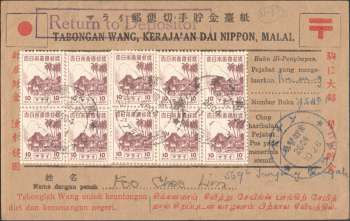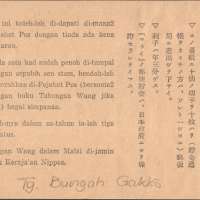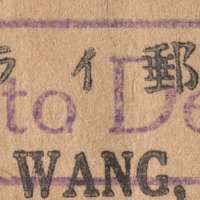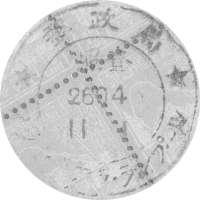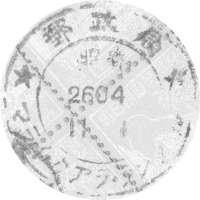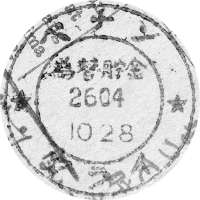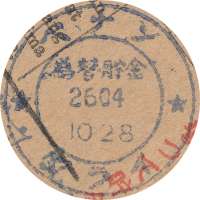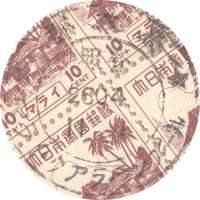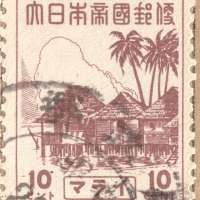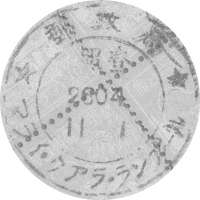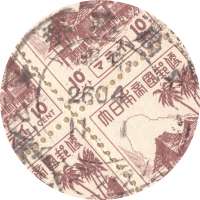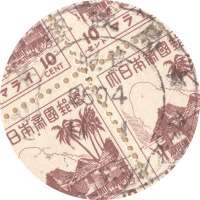STAMP PHILATELY
Japanese Occupation of Malaya : Postal Savings Card (1944)
Japanese Occupation of Malaya : Postal Savings Card (1944)
INTRODUCTION
Many nations' post offices operated or continue to operate postal savings systems to provide depositors who do not have access to banks a safe, a convenient method to save money and to promote saving among the poor.
The first nation to offer such an arrangement was Great Britain in 1861. It was vigorously supported by Sir Rowland Hill, who successfully advocated the penny post, and William Ewart Gladstone, then Chancellor of the Exchequer, who saw it as a cheap way to finance the public debt. At the time, banks were mainly in the cities and largely catered to wealthy customers. Rural citizens and the poor had no choice but to keep their funds at home or on their persons.
A postal savings card was a form of war bond used in Japan and some of her occupied territories. The customer bought stamps until the card was filled up at which time it was turned in to the post office. In theory they paid out interest.
Savers accumulated postal savings stamps in denominations of 10 cents. The stamps were then be pasted onto deposit cards and once full redeemed (by means of transfer) into to a proper book.
Postal Savings Card
The card is a brown-cream in colour.. Other colours are known to exist: blue, orange and purple.
Purple handstamp cachet: Return to Depositor.
On the reverse, a manuscript: Tg. Bungah Gakkō
Probably was issued to a school student, at it refers to Tanjong Bungah School ( が っ こ う )
The card's owner name was Foo Chee Lim.
Postmark 2, 3 & 4
Black, on the stamps
1 November 2604 (1944 AD) Kuala Lumpur, Marai.
金 on line 2 is only an assumption.
郵 政 局 = Postal Service
ク ア ラ ラ ン プ ー ル = Kuala Lumpur
Postmark 1 (Issuing Office)
Blue, on right side
28 October 2604 (1944 AD), Penang.
ペ ナ ン = Penang
為 替 貯 金 = exchange savings.
Stamps
Ten stamps of definitive series were used. Five vertical pairs and therefore it is assumed that all these stamps were stick together at once.
10 cents stamp depicts Malay fishing village.
Obverse
Chinese text on the left of the card is: 郵局儲金 便利稳固 which translate as Postal Savings, convenient and stable.
Reverse
It might be worth noting that the item is described as a 'book' (Buku Si-Penyimpan = Saver's Book) on the front, but as 'card' (Kad) on the back. Both the Japanese and Malay texts speak of submitting the card with the Savings Book if available.
There is 'Issuing Office: Penang', and under the 'CDS of Post Office receiving these stamps' there is a manuscript '569c Tanjong Bungah' (which is in Penang.)
The Malay instructions on the back are basically the same as the Japanese text.
Many nations' post offices operated or continue to operate postal savings systems to provide depositors who do not have access to banks a safe, a convenient method to save money and to promote saving among the poor.
The first nation to offer such an arrangement was Great Britain in 1861. It was vigorously supported by Sir Rowland Hill, who successfully advocated the penny post, and William Ewart Gladstone, then Chancellor of the Exchequer, who saw it as a cheap way to finance the public debt. At the time, banks were mainly in the cities and largely catered to wealthy customers. Rural citizens and the poor had no choice but to keep their funds at home or on their persons.
A postal savings card was a form of war bond used in Japan and some of her occupied territories. The customer bought stamps until the card was filled up at which time it was turned in to the post office. In theory they paid out interest.
Savers accumulated postal savings stamps in denominations of 10 cents. The stamps were then be pasted onto deposit cards and once full redeemed (by means of transfer) into to a proper book.
Postal Savings Card
The card is a brown-cream in colour.. Other colours are known to exist: blue, orange and purple.
Purple handstamp cachet: Return to Depositor.
On the reverse, a manuscript: Tg. Bungah Gakkō
Probably was issued to a school student, at it refers to Tanjong Bungah School ( が っ こ う )
The card's owner name was Foo Chee Lim.
Postmark 2, 3 & 4
Black, on the stamps
| 郵 政 局 昭 金 2604 11 1 マ ラ イ ・ ク ア ラ ・ ラ ン プ ー ル |
1 November 2604 (1944 AD) Kuala Lumpur, Marai.
金 on line 2 is only an assumption.
郵 政 局 = Postal Service
ク ア ラ ラ ン プ ー ル = Kuala Lumpur
Postmark 1 (Issuing Office)
Blue, on right side
| ペナン 為替貯金 2604 10 28 マライ |
28 October 2604 (1944 AD), Penang.
ペ ナ ン = Penang
為 替 貯 金 = exchange savings.
Stamps
Ten stamps of definitive series were used. Five vertical pairs and therefore it is assumed that all these stamps were stick together at once.
10 cents stamp depicts Malay fishing village.
Obverse
| • | マ ラ イ 郵 便 切 手 貯 金 臺 紙 | 〒 | |||||||||
| TABONGAN WANG, KERAJA'AN DAI NIPPON, MALAI. | |||||||||||
| 郵 局 儲 金 便 利 稳 固 |
|
Buku Si-Penyimpan.
Pejabat yang menge-luarkan ............. ..................... Nombor Buku ....... |
胸 に 大 詔 誓 っ て 貯 金 |
||||||||
|
|
Chap haribulan Pejabat Pos yang menerima stem2. |
||||||||||
| 姓 名 Nama dengan penoh ........................................ |
|||||||||||
|
|||||||||||
Chinese text on the left of the card is: 郵局儲金 便利稳固 which translate as Postal Savings, convenient and stable.
Reverse
| 1. Kad ini boleh-lah di-dapati di-mana2 Pejabat Pos dengan tiada ada kena bayaran. 2. Apabila satu kad sudah penoh di-tampal dengan sepuloh sen stem, hendak-lah di-serahkan di-Pejabat Pos (bersama2 dengan buku Tabongan Wang jika ada) bagai simpanan. 3. Faedah-nya dalam satahun ia-lah tiga peratus. 4.Tabongan Wang dalam Malai di-jamin oleh Keraja'an Nippon. |
障 セ ラ レ ラ イ マ ス 。 |
▽ 「 マ ラ イ 」 ノ 郵 便 貯 金 ハ 、 日 本 政 府 ニ ヨ リ 保 |
▽ 利 子 ハ 年 三 分 デ ス 。 |
局 ニ 差 出 シ テ 下 サ イ 。 |
帳 ヲ オ モ チ ノ 方 ハ 、 ソ レ ト 一 シ ョ ニ ͜ 郵 便 |
▽ コ ノ 臺 紙 ニ 十 仙 ノ 切 手 ヲ 十 枚 ハ リ ͡ 貯 金 通 |
上 ゲ マ ス 。 |
▽ コ ノ 臺 紙 ハ 、 郵 便 局 デ 希 望 ノ 方 ニ 無 料 で 差 |
It might be worth noting that the item is described as a 'book' (Buku Si-Penyimpan = Saver's Book) on the front, but as 'card' (Kad) on the back. Both the Japanese and Malay texts speak of submitting the card with the Savings Book if available.
There is 'Issuing Office: Penang', and under the 'CDS of Post Office receiving these stamps' there is a manuscript '569c Tanjong Bungah' (which is in Penang.)
The Malay instructions on the back are basically the same as the Japanese text.
COMMENTS
NEW COMMENT
#303 Sunday 07 August 2022 04:52:45 PM
Phillips D Jospeh
Singapore
I have manage to buy a similiar card, its Pink in Colour and from the state of Malacca. Its Postmark 2604/4-12. Anyone have info on this state issue. I can be contactable at my Email, Many Thanks
|
The following text must accompany any text or photo taken from this page and limited use for non-commercial purposes only.
Texts and Images were taken from and courtesy of Exonumi.com
URL: http://www.exonumi.com/publish-SP.1.1272
|
|
